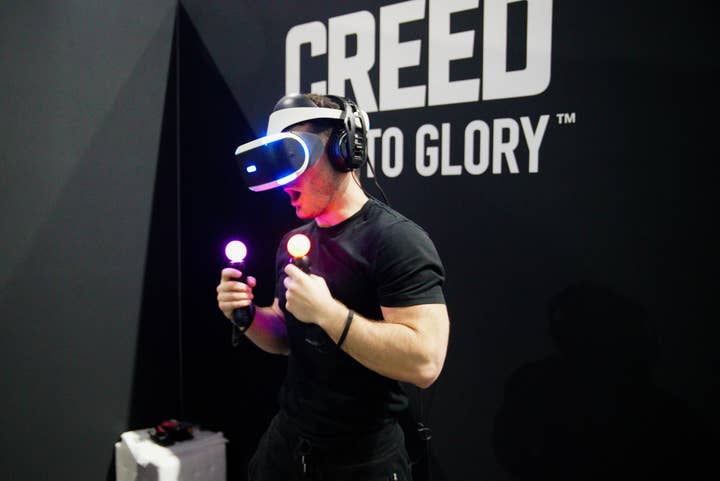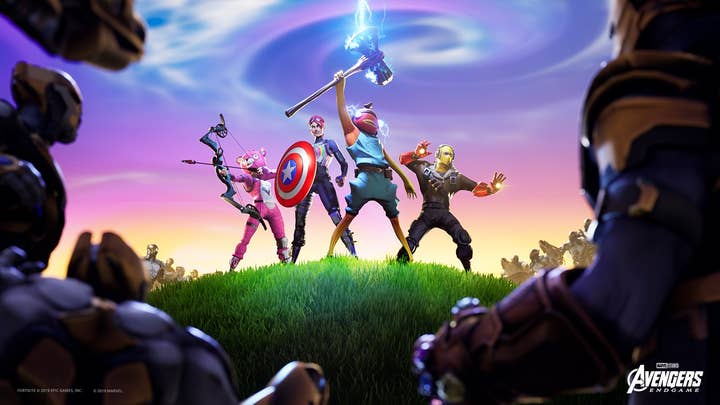Survios' TQ Jefferson: VR has arrived
Studio's chief product officer points to Quest 2 outselling Xbox Series X|S hardware as evidence, discusses brand crossovers in Fortnite and the metaverse
VR specialist studio Survios expanded its catalog last year to include non-VR games, but the developer behind Creed: Rise to Glory and the upcoming multiplatform Aliens title is still bullish on the future of VR.
In a featured session at Megamigs in Montreal last month, Survios chief product officer TQ Jefferson was pretty stoked about its present as well.
Jefferson delivered a talk titled, "Is VR Still Five Minutes Away?" The name came from a 2020 Polygon article in which it was stated that the VR revolution has been "five minutes away" for the past eight years.
Speaking with GamesIndustry.biz in advance of that presentation, Jefferson acknowledges the current VR push had some growing pains. The headsets were cumbersome and hard to set up. VR experiences were often tacked on as an extra mode to a traditional game rather than built from the ground-up to take advantage of the technology. And of course, there was the motion sickness.
It didn't live up to the hype surrounding the tech, Jefferson says.
"Early expectations were unreasonable," he says. "From an analyst standpoint, they were coming off of mobile games and saying, 'Fuck sliced bread. This is going to be amazing.'
"From a consumer standpoint, they wanted the Holodeck. What they got was some goofy goggles, a wall partition separating them from other people, and wires everywhere. They wanted the Holodeck and VR was not the Holodeck. And I don't know if it should, to be honest with you."
But Oculus had the Rift, and companies like HTC and Sony started moving the needle with their own headsets, particularly with PSVR being introduced into the PlayStation ecosystem and selling millions of units. But Jefferson says the real "game changer" was the Meta Quest 2, an untethered headset with better resolution and controllers than its predecessors and a (since raised) $299 price point that made it far more accessible than its higher-end counterparts.

The Quest 2 also launched just a month before Polygon asked that 'five minutes away' question that stuck with Jefferson.
"Is it still stuck in the future," he asks. "My answer to that is no. It's here, right now. Quest 2 outsold Xbox last year. To me, that means it's arrived on a consumer scale."
While neither Meta nor Microsoft are forthcoming with unit sales for the hardware, Niko Partners' Daniel Ahmad put Series X|S sales at 12 million early this year, while IDC's Francisco Jeronimo had Quest 2 approaching 15 million sold back in June.
Beyond the unit sales, Jefferson points to the diversification of experiences and uses of the tech. Fitness games have created a secondary market beyond pure entertainment experiences, and he believes the Meta Quest Pro points to growth for the technology in other areas.
"Billions and billions of dollars are being pumped into VR through enterprise, automotive, transportation, military, telecom, and healthcare..."
"Billions and billions of dollars are being pumped into VR through enterprise, automotive, transportation, military, telecom, and healthcare in terms of VR viewing, exposure therapy, and all these different vectors," Jefferson says. "So now you've got this platform, this medium, that is entertainment on one side and enterprise and health care on the other. To me, that's not a dead platform. That's not a platform that's failed."
And that's to say nothing of film production, where Jefferson says virtual production techniques using VR technology have gone mainstream behind-the-scenes with shows like The Mandalorian and The Lord of the Rings: The Rings of Power.
Despite that, those initial expectations have not been lived up to. And while managing expectations is usually wise, Jefferson doesn't think it was necessarily bad for VR as a whole to have the bar set so high initially.
"There's always the intense initial investment followed by the trough of disillusionment," he says. "I don't think it was a bad idea that there was so much interest and investment in it early because it allowed teams to start working and building in the space, and to get far enough that when the trough of disillusionment came, there was still enough momentum to ride it out."
Failed endeavors and a few bad actors aside, Jefferson says, "the people who stuck it out and were passionate about it were able to ride those waves and keep pushing forward."
If we measure passion by dollars, few in VR have been anywhere near as passionate as Meta. And while it has the Quest 2 to show for its efforts, it is increasingly under pressure from investors over ongoing losses in the billions at its Reality Labs AR/VR division.
So what happens if the biggest player in VR decides its plan to create a metaverse on AR and VR technology is no longer viable?
"I don't think it does anything to VR," Jefferson says. "Although VR is a component of the metaverse and a building block, it's a separate endeavor. You can have VR without the metaverse but I don't know if you can have the metaverse without VR. So if Meta decides to change its name back to Facebook and not pursue the metaverse anymore, there's still an incredible business in VR applications and hardware. We've seen that in the numbers for Quest 2 alone."
"If you have a company as large as Meta, the money coming in from Quest 2 VR is probably a rounding error for them"
But even a successful VR business might not hold the attention of a massive company that had been betting on it for so much more.
"If you have a company as large as Meta, the money coming in from Quest 2 VR is probably a rounding error for them," Jefferson says. "So if they retreated from the space completely and stopped doing VR, I think it would be a serious blow to the medium. But I also think there's Apple, there's ByteDance, and other players in the space. Sony's not backing off of it. There are corporations out there that would keep pushing it forward, that believe in it enough."
Regardless of what happens with the VR efforts of Meta and other companies, Jefferson doesn't think VR is going to be stuffed back into the closet like it was when the early '90s VR push faded from view.
"Anything can happen, but I think now it's proven itself enough that it wouldn't just be lockered," Jefferson says. "That diversification of purpose has given it enough touchpoints and enough use cases that I don't see it just getting shelved. In the '90s, it was super-nascent and much easier to put the genie back into the bottle. Now I think the genie's pretty freaking big, to keep the analogy going, and the bottle's kinda small at this point."
Beyond VR, Jefferson has a strong background in licensing. He has at various points in his career handled licensed games from both sides in stints for Pixar, Marvel, Telltale Games, Skybound, and 20th Century Fox. Given that past and VR's foundational presence in many metaverse visions companies are pursuing, we ask for his perspective on the trend.
"When you're looking at things like Ready Player One and all that, they make it a point to show Batman, Captain America, MechaGodzilla, Gundam, and so on," Jefferson says. "Everything is coming together. From a licensing IP standpoint, that is a much trickier problem to solve."

He points to Fortnite as a game that has apparently solved that problem, and explains why it – and some other popular titles for tie-ins – have been accepted by license-holders.
"There's an abstraction layer from an IP continuity lens that makes it acceptable for them to be in that world together," Jefferson says. "Because it's not the actual character, it's a simulation of the character, a hologram of the character. And as a projection, it sidesteps the narrative and licensing baggage that always accompanies licensed IP."
It also helps that Fortnite exists as a precedent other people can point to showing that allowing characters to crossover isn't the end of the world, but Jefferson cautions that it becomes trickier once you start having a narrative or characters interacting in a deeper way.
"I predict that would be a problem for many of these license holders," Jefferson says. "Who has more lines? Whose story is it? Is so-and-so portrayed in a proper light? All of these things become considerations."
"Watching Thanos do 'The Running Man'? It would keep me up at night, were it still my responsibility to worry about those things."
He adds that license holders would also likely be concerned about having their own popular characters elevate lesser characters from competitors simply by associating with them in a game like that.
"That's a consideration," he says. "I have personally seen games not happen because of that brand question."
As for what he thinks about the trend of brand crossovers in games like Fortnite, Jefferson has some reservations.
"When Thanos showed up in Fortnite, that was a surprise I think to a few people at Marvel," Jefferson says. "I think the Russos did that. But then Thanos dancing? As someone who licensed these characters, you pay a great deal of attention to how this character will be represented in the world and what they're going to be doing. Watching Thanos do 'The Running Man'? It would keep me up at night, were it still my responsibility to worry about those things."
As for whether Fortnite means these sort of massive license crossovers are another genie too big to go back in the bottle, Jefferson is skeptical.
"I think it's easy enough to maintain some control over that. When something's as big as Fortnite, you make your peace with it.
"But it has to be something that big that's super-compelling where the eyeballs on your IP outweigh other considerations."
Sign up for the GI Daily here to get the biggest news straight to your inbox









